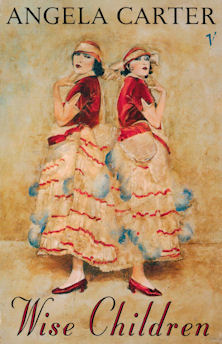
First published: 1991.
Edition read: Vintage Classics, pub. 1992.
Provenance: purchased from Bookends in Carlisle.
Read: December 2014, curled up in an armchair next to the Christmas tree.
—————————————————————
Angela Carter was a revelation. I started her book of cultural criticism, The Sadeian Woman, in my second year of university, given it by a friend who was two years older and who, as a Finalist, had attained a level of world-weary knowingness that awed me. I didn’t manage to finish the book because, frankly, I hadn’t read enough secondary material to know what to do with it, and it scared me. Even then, though, I could recognize that this writer was totally unique. No one else thought like this, or if they did, they didn’t write it down so sensibly. Last year, I read The Bloody Chamber, her collection of re-imagined fairytales, and made the wonderful, rare discovery that every line in the book was quotable in its brilliance, beauty and wit. When it came time to make this list of fifty, I put her novel Wise Children on it, keen for more of the same. It wasn’t quite the same.
Which is not to say that I didn’t enjoy it. Wise Children is a novel that pays homage to, among other things, Shakespeare, especially Shakespearean comedy and the later romance plays; it has twins, doublings, the possibility of incest, a contrast between “high” and “low” culture and lifestyles, and a persistent questioning of legitimacy. The two sisters at the heart of the story are Dora and Leonora (known, mostly for brevity’s sake, as Nora) Chance, chorus girls, dancers and sometimes actresses on the vaudeville and chorus hall circuit of early twentieth-century London. They are the bastard children of Sir Melchior Hazard, the greatest Shakespearean actor of his generation, an Olivier figure who never acknowledges them as his own and who is quite content to let the world think that they are his brother Peregrine’s by-blows. The two names–Chance and Hazard–are playfully resonant: both mean “luck” or “fortune”, though Chance is a simple word and Hazard a grander one. These names are Carter’s first warning that Wise Children will be about the differences between subcultures within the same country, and the potentially awful consequences that may visit you if you choose to ignore the less picturesque aspects of your own history. You could, I suppose, call it an allegory.
Spotting the Shakespeare references scattered throughout the book is highly diverting; there is, for instance, the fact that Melchior Hazard’s mother met her husband while playing Cordelia to his King Lear, an imaginary incest which parallels the Chance girls’ childhood crush on their famous father. (This also mirrors the uncomfortable father/daughter dynamic in Pericles, where the exiled king encounters a girl in a brothel who turns out to be his long-lost daughter, Marina.) My favorite, however, has got to be a scene set during a game show broadcast. The Chance sisters have an extended unofficial family which includes “little Tiffany”, their goddaughter, who is now in her early twenties, and an extended official family, which includes Tristram Hazard, their half-brother. Tiffany and Tristram, both carrying on the family line by working in show business, co-host a game show called “Lashings of Lolly” (I don’t think you’re meant to understand what this means; I certainly don’t.) They are also dating, and as the novel opens, Tiff is pregnant with Tristram’s baby. In a rather extraordinary scene, she descends a staircase on the set of Lashings of Lolly during a live broadcast, apparently out of her mind, alternately singing and talking nonsense, before taking off her clothes and dashing, naked and unstoppable, from the studio. It’s painfully funny, and it’s as obvious a parody of Ophelia’s mad scene in Hamlet as I’ve ever read.
Mostly, Wise Children (like Shakespeare) is about generation, and generations. The novel’s title comes from an old saying: “It’s a wise child who knows its own father.” The traditional view of parenthood, where paternity is nearly impossible to establish but maternity is nearly impossible to deny, is interrogated and turned inside-out by the book’s events. Where paternity is so often disputed, we have, in the end, a disputed maternal line for the Chance sisters as well; there is some suggestion that their mother might have been the woman who raised them and whom they considered to be their grandmother. This totally destabilizes the idea of heredity: if women no longer occupy a position of immobility, their children could be anything, could inherit all manner of undesirable traits, from unknown forebears. Even unbroken heredity is as much a curse as a blessing: you have to destroy your progenitor in order to become your own person, but more often than not, you become the thing you thought you’d put behind you. Melchior, on his 100th birthday, dresses as his famous father, Ranulph, who killed Melchior’s mother, her lover, and himself. Is he being his father, or defeating him? Is it possession or exorcism, damnation or redemption?
This is a hugely entertaining book, but not a particularly easy one to review. It’s not even particularly easy to describe, or analyze. I have not pulled any quotes from it; few leap out. It addresses large questions but makes no claims about any of them. Carter’s point, presumably, is that supposedly clear demarcations between the known and unknown, the legitimate and illegitimate, the normative and deviant, are actually very blurred lines. I’d recommend Wise Children, but it’s more diffuse than her most notorious work, lacking the intensity and precision of The Bloody Chamber. Still–as the Lucky Chance sisters would no doubt tell you–different doesn’t have to mean bad.
One thought on “Wise Children, by Angela Carter”